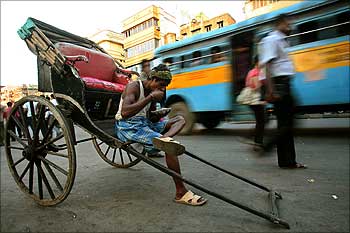
A lot can happen over coffee. Mudar Patherya and a couple of friends met one late September afternoon at Barista on Lansdowne Road, one of the more pleasant parts of south Kolkata, for what people of the city are best at doing: talking without an agenda.
But as happens with many a useful adda, something tangible emerged.
Successful professionals steeped in the folklore of markets and individual initiative, they discussed the rejuvenation of cities across the world, from Chicago to Shanghai, and wondered -- why not do something ourselves instead of waiting for the government which, being well versed in their literature, they felt was like waiting for Godot.
Soon Mudar, as people across generations call him, and some of those friends took to scouting the city's streets on early mornings to find ugly garbage dumps in prominent places to clean up.
They found a 'low hanging fruit', in the marketing jargon familiar to them, right in the heart of town. In one corner of Dalhousie Square, lined by fine heritage buildings from the days of the Raj such as the General Post Office and Writers' Buildings, seat of the state government, lay an unbelievable garbage dump with the shells of two abandoned cars perched on top.
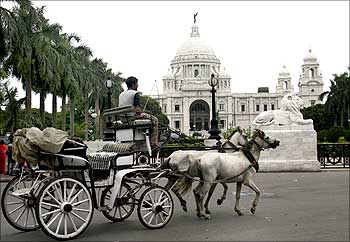
So one morning in early October, the spot saw a rather unusual gathering: about 50-odd individuals of various age, two dozen uniformed 'green police volunteers', and a fair collection of hoes and shovels.
Backing them up on the road were three garbage trucks, a towing truck for vehicles, and a posse of policemen with benign expressions and a wireless van, come to cast a watchful and protective eye. In two hours, most of the garbage and the shells of the two cars were gone and those assembled left feeling elated. They had actually liberated 600 sq ft of public space from garbage.
The best thing happened the next morning -- pictures in a couple of papers and a longish story in one of them on the initiative. The group was galvanized to do more.
They discovered another easy target -- a low jungle on top of piled-up compacted garbage, hiding a stinking public toilet, next to a water hyacinth-covered waterbody, again in as central a Kolkata location as you can get -- the part of the Maidan at the crossing of Chowringhee and Park Street.
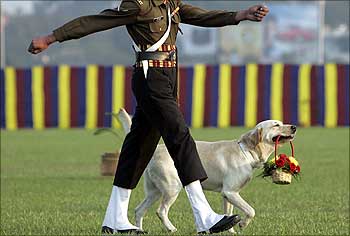
Then began a minor saga of action by citizens, with help from within officialdom via individual initiative and growing corporate involvement.
In close to two months, 50,000 sq ft of the Maidan has been fairly cleaned up, a 70,000 sq ft waterbody rid of its water hyacinth, 40 tonnes of garbage removed and, most importantly, work actively afoot to clean up and level out an adjoining 100,000 sq ft in order to convert it into a four-cricket pitches square and surrounding outfield.
Since action was taking place on the Maidan, which is under the control of the army, Mudar and friends first spoke to officials in OG who said, good idea, we will send a couple of hundred NCC cadets who come on Sunday for their weekly parade to help out.
That day school children, volunteers and the NCC boys and girls all chipped in. Seeing the progress, Mudar and friends decided to do something even bolder -- make the initiative an intercommunity effort.
Then it became clear that a payloader would greatly help speed up things. So an appeal was made to, first, the Kolkata Municipal Corporation and then TIL, the city corporate that deals with payloaders. They both helped, along with promise of more.
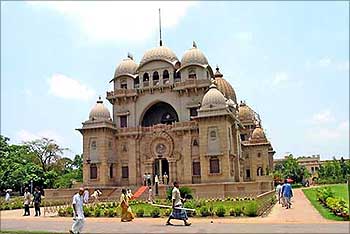
The cleanup drive owes a lot to Satnam Singh Ahluwalia, secretary of the Khalsa High School in south Kolkata. He made it a school initiative with one section of around 40 reporting at the Maidan by turn every day for 15 days (culminating in Guru Nanak's birthday on November 2) and their attendance being taken there on the Maidan.
Satnam also got his Sikh community involved. Early in the initiative, in his capacity as secretary of the Behala Gurudwara Prabandhak Committee, he hosted an intercommunity representatives' meeting at the gurudwara which led to the big day on the Maidan in which joined youngsters and elders belonging to the Sikh, Chinese, Bohra, Ahmadiyya, Khoja and Jewish communities plus a mixture of Marwaris, Punjabis and Bengalis.
On a couple of days the gurudwara people ran a mini langar at the cleanup site distributing water and sweet lassi.

Satnam echoes a common feeling among the volunteers when he says, "We should stop blaming each other and the government, take some time out and do something."
For him, the great gain has been the change in attitude among some of the children who, having joined the initiative and cleaned the muck, have confessed to becoming more conscious about littering.
A key enabler in the initiative who has self-evasively worked behind the scenes is stockbroker Rajesh Somani.
Somani's big asset is his links with the transport world which has enabled him to arrange the trucks to take away the garbage that volunteers have piled up. It needs some prodding to get him to reveal that he has also spent from his pocket to hire the trucks.
Others have helped too -- the Monginis group supplied cakes for the children, some supplied sandwiches, someone gave 500 cotton gloves so you didn't have to use plastic gloves and add to the litter, others gave or paid for hoes, shovels and wheelbarrows, yet others paid Rocky, the local slum teenager who has only one useful eye, to bring along his friends and remove the water hyacinth.
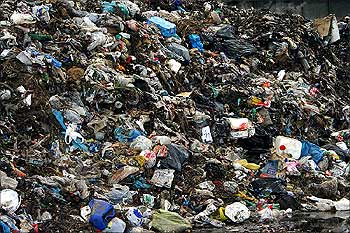
On one of the days, state PWD minister Kshiti Goswami joined the volunteers. Army officers have promised to do so in civvies. The US consul general wanted to join but since the Maidan is with the army, protocol got in the way.
Ravi Todi, whose grandfather migrated to Kolkata and who considers himself a hard core Kolkatan, finds the initiative appealing and turned up to clean the garbage on the first day.
A well-known businessman with interests in real estate, finance and engineering, he came to know of the initiative from Mudar's weekly email. "We should not wait for the government to take an initiative in such matters," he feels. "Once the government realises what we are doing, they will be forced to take such initiatives themselves."
Paul Chung, president of the Indian Chinese Association for Culture Welfare and Development, joined in the intercommunity planning meeting at the Behala gurudwara.
The elderly Chung's grandfather came to the city in the late nineteenth century and his father around 1910. Chung was student, teacher and eventually vice-principal at Don Bosco school in Liluah, near Kolkata.
On the big day of the Maidan cleanup, he brought along a group of Chinese college students and elders.
"Youngsters have lots of stamina but they are whimsical. They were happy to do something like this. They want to clean up Tangra," an area in east Kolkata where many Chinese live.
But he has 'asked them to do what is possible. They have to create a sense of community and unity. Once a commitment is made then a lot can be done. For that there has to be an orientation and a core group, then the rest can come and go.'

Why has this initiative worked so well, so far? A winning combination of voluntary effort, networking capability, backward linkages, access to the media, critical help from senior government officials who used their discretion to provide things like trucks and payloaders, and finally, linking up with corporates who are ready to come forward, courtesy their CSR budgets, as soon as they see tangible action.
At the centre of all this stands Mudar with his computer and BlackBerry handset through which he frenetically networks through his waking hours.
He began working life as a sports journalist, switched to financial analysis and investment services and has thereafter become a successful entrepreneur specialising in producing well-designed and researched, value-added annual reports, books and glossies for companies. His greatest tool is the weekly mail on what is happening to 1,700 friends and acquaintances.
Tilak Mehera, who is into tea and divides his time between Kolkata and Mumbai, heard of the initiative through the 'grapevine' -- more specifically from Smita Bajoria, an industrialist's spouse who has been working on other initiatives with Mudar -- and joined up.
His idea was 'to lend a hand, as most of our public spaces are so badly managed, with everyone blaming others'. He wanted to make sure the volunteers work systematically. "There was, for example, a lot of haphazard work by children."
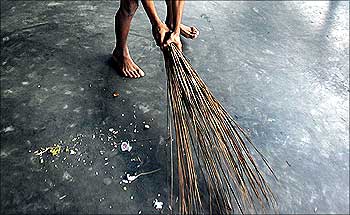
Others found he was particularly good with children! He feels, "We should work in a sustainable way. Visibility is not the issue, sustainability is."
What we should do, he says, is "start with our own backyards, our own building, as living in a clean environment is a health imperative. The problem with most of our public places is there is nowhere to chuck the rubbish. The Maidan has no dustbins, no public toilets."
His fear is that "we may have to come back, do it again, unless we get citizens and the government to take over after we have shown that it [cleaning up] can be done.
And it has to be the aam admi who has to take ownership of public spaces. There has to be an organised civilian workforce to keep things clean -- for that, you can't rely on the army or the police. Kolkata's soil and rainfall being what it is, the jungle can come back. The need is to have a serious approach, take small steps and ensure the initiative does not peter out."